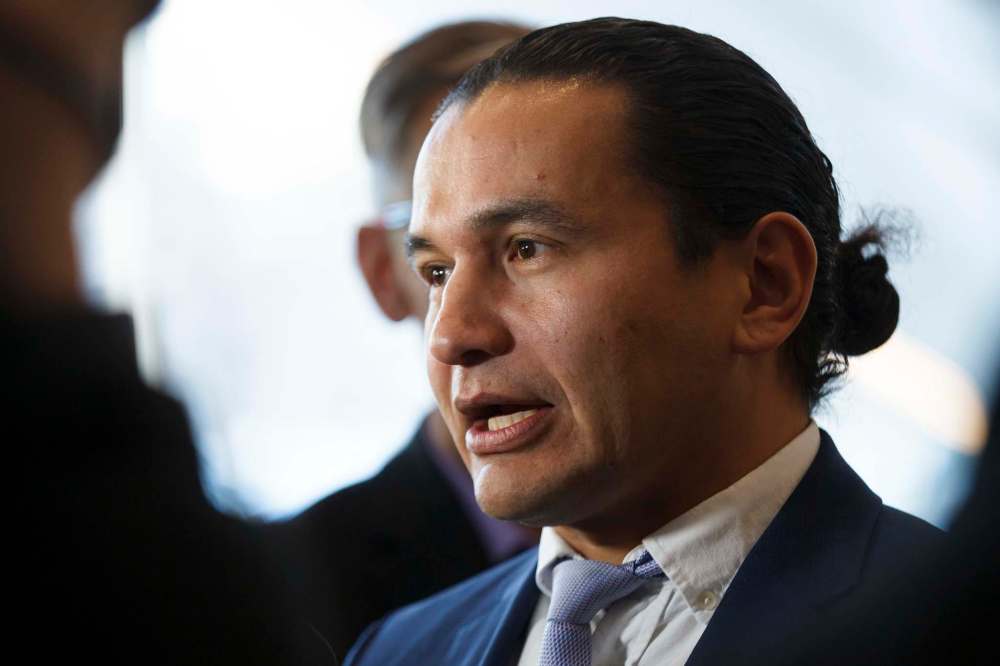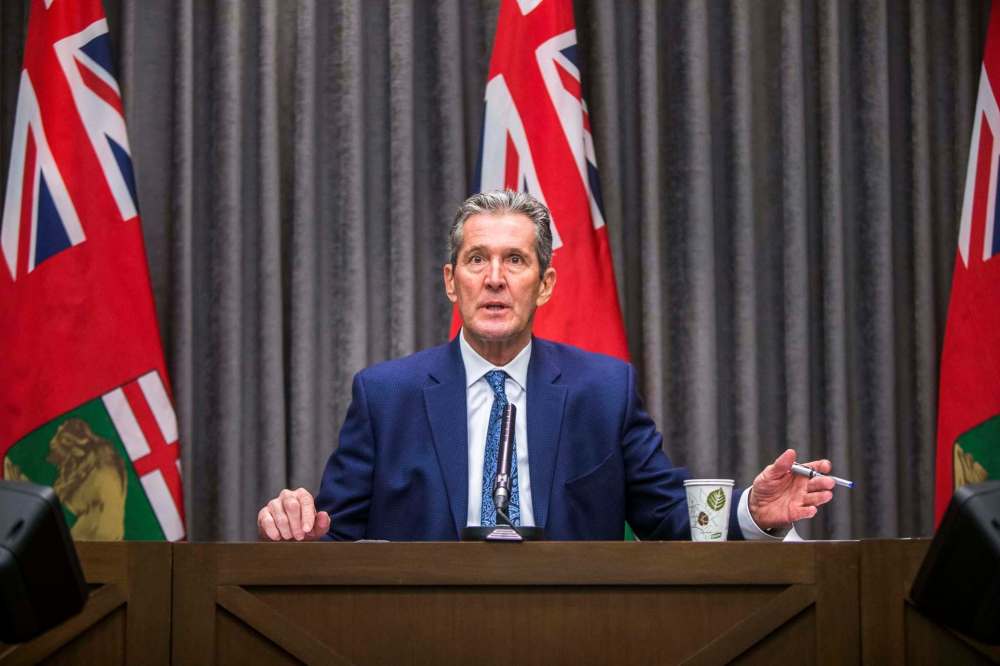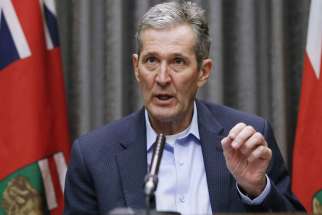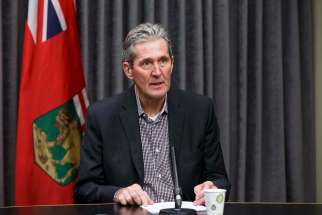Provincial government memo suggests layoff threat hanging over civil-service
Read this article for free:
or
Already have an account? Log in here »
To continue reading, please subscribe:
Monthly Digital Subscription
$0 for the first 4 weeks*
- Enjoy unlimited reading on winnipegfreepress.com
- Read the E-Edition, our digital replica newspaper
- Access News Break, our award-winning app
- Play interactive puzzles
*No charge for 4 weeks then price increases to the regular rate of $19.00 plus GST every four weeks. Offer available to new and qualified returning subscribers only. Cancel any time.
Monthly Digital Subscription
$4.75/week*
- Enjoy unlimited reading on winnipegfreepress.com
- Read the E-Edition, our digital replica newspaper
- Access News Break, our award-winning app
- Play interactive puzzles
*Billed as $19 plus GST every four weeks. Cancel any time.
To continue reading, please subscribe:
Add Free Press access to your Brandon Sun subscription for only an additional
$1 for the first 4 weeks*
*Your next subscription payment will increase by $1.00 and you will be charged $16.99 plus GST for four weeks. After four weeks, your payment will increase to $23.99 plus GST every four weeks.
Read unlimited articles for free today:
or
Already have an account? Log in here »
Hey there, time traveller!
This article was published 22/04/2020 (2062 days ago), so information in it may no longer be current.
An internal government memo says layoff notices may be issued to the civil service while the province is still “exploring options” about voluntary work-reduction and Employment Insurance work-sharing agreements.
“Our goal is to minimize actual layoffs but our collective agreements require notice periods,” said the memo sent Wednesday on behalf of Michael Richards, deputy secretary of cabinet and Charlene Paquin, civil service commissioner.
If the civil service doesn’t come up with the workforce cost reductions that the provincial government requested, legislation will be used as a “last resort,” the memo warned.

“That’s a brutal negotiating tactic,” NDP Opposition Leader Wab Kinew said Wednesday after calling for the house to reconvene so the government can be held accountable for its proposed public-sector cuts and looming layoffs.
“It really is a heavy-handed approach to get people to agree to give up their incomes or jobs.”
The memo “terrified” public-service employees who’ve been waiting to hear the province’s plans for voluntary work reductions and if its proposed Employment Insurance work-sharing scheme has been approved, the president of the Manitoba Government and General Employees’ Union said.
“It absolutely is menacing,” said Michelle Gawronsky, who said she has been taking calls from both union members and non-members with questions about the memo warning about layoff notices:
“Aren’t we in discussions? Are we going to be laid off anyway?”
Province MIA in fight for business sector

Posted:
The focus of Manitoba’s COVID-19 efforts has, quite properly, been on slowing the spread of the virus and providing the necessary resources so we can enable our public-health system to properly treat all those who contract the virus.
Premier Brian Pallister’s proposed civil-service cuts seeking up to 30 per cent cost reductions during the pandemic have produced panic among public-sector workers, drawn criticism from the opposition and dire warnings from prominent local businessman and former Manitoba Hydro chairman Sandy Riley.
Concerns about layoffs during the COVID-19 crisis are economic, not just partisan, political or personal, the Conference Board of Canada said. At times like this, with the economy contracting and so much uncertainty, governments need to prime the pump, not take their foot off the gas, the non-partisan think-tank said.
“Typically, when you have a very large shock to the economy, governments will increase spending to act as a buffer and absorb some of the impact,” the Conference Board’s associate director of economic forecasting Alicia Macdonald said Wednesday.
“When you start reversing that and look at economic cuts, it tends to exacerbate the problem,” said the Ottawa economist.
Pallister has said it’s time to cut spending in one part of the public service on non-essential workers to ramp up spending for essential front-line services battling the virus.
“Some governments are making that argument,” said Macdonald. “Money is still flowing into the economy but that doesn’t provide the same stimulus as where they’re ramping up spending to help the economy.”
There can be unintended consequences of trying to save money by laying off government workers in a recession. Before last century’s Great Depression, governments cut public-service spending to save money.
“Instead of helping to buffer the economy, the government made it worse by taking more money out of the economy,” she said.
“One thing to remember when a sense of normalcy (returns) is the fewer consumers impacted, the better it will be for those businesses. You’re relying on people to come back and frequent your business. The more people who lost their jobs, the fewer the people who have money to spend and the more it will stall the economy.” – Economist Alicia Macdonald
The Pallister government got approval in an emergency session of the house on April 15 to borrow $5 billion to respond to COVID-19 but remains intent on cuts to the public service. The premier has stated several times that the private sector has suffered the most as the result of the pandemic, while the public sector is providing less service during the pandemic, so layoffs are justifiable.
Punishing the public sector may not help the private sector or the province in the long run, said Macdonald.
“One thing to remember when a sense of normalcy (returns) is the fewer consumers impacted, the better it will be for those businesses. You’re relying on people to come back and frequent your business. The more people who lost their jobs, the fewer the people who have money to spend and the more it will stall the economy.”
Pallister’s proposed cuts would hurt the economy and make things worse, Kinew predicted.
“All these people facing layoffs, jobs cut, a reduced work week will have less money to spend on food-delivery services, grocery stores or to order something online form local businesses trying to survive,” Kinew said.

The premier should follow the example of a fellow Conservative who helped Canada get through the last economic crisis.
“Think back to 2008 when Stephen Harper stood up and said governments have to spend money during a recession,” Kinew said. “He spent money to keep jobs and wages.”
Rather than laying off government workers, the Pallister government could redeploy them across the economy to help Manitoba be the first province to safely and successfully reopen, Gawronsky said.
“Instead of using the crisis as an excuse to lay people off, why isn’t he looking creatively to harness people’s skills and get through this?”
In addition to casino workers redeployed to Liquor Marts to help with bottle delivery and COVID-19 sanitizing, government workers could be assigned to help the private sector as social-distancing monitors and ushers for businesses that reopen, for example, Gawronsky said.
Instead of having a private firm such as Dynacare calling people who’ve tested negative for COVID-19, government workers already on the payroll could be making those calls, the union president said, adding they can be sent to help with essential services where workers are feeling swamped, she said.
“We can all wash a floor, if that means I’m going to keep my paycheque,” she said.
carol.sanders@freepress.mb.ca

Our newsroom depends on a growing audience of readers to power our journalism. If you are not a paid reader, please consider becoming a subscriber.
Our newsroom depends on its audience of readers to power our journalism. Thank you for your support.
History
Updated on Wednesday, April 22, 2020 8:10 PM CDT: fixes typo
Updated on Wednesday, April 22, 2020 9:14 PM CDT: Updates headline





